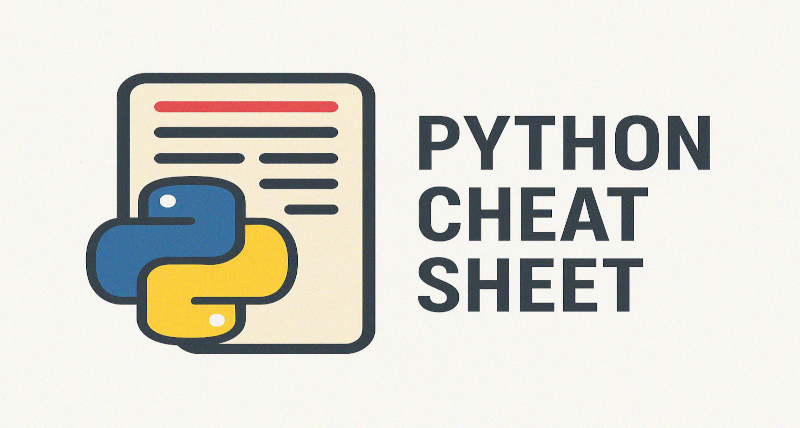
Python Cheat Sheet
Variables and Data Types
string_var = "Hello, World!"
int_var = 42
float_var = 3.14
bool_var = True
list_var = [1, 2, 3, "four", 5.0] # Mutable
tuple_var = (1, 2, 3) # Immutable
dict_var = {"name": "Alice", "age": 30, "is_student": False}
set_var = {1, 2, 3, 4, 5}
Type Casting
str(int_var) # Converts int to string
int(float_var) # Converts float to int
float(int_var) # Converts int to float
bool_var = bool(1) # Converts integer to boolean (1 is True, 0 is False)
list_var = list(set_var) # Converts set to list
tuple_var = tuple(list_var) # Converts list to tuple
User Input
user_input = input("Enter something: ")
Arithmetic Operations
friends = 0
friends += 1 # Increment
friends -= 1 # Decrement
friends *= 2 # Multiply
friends /= 2 # Divide
friends %= 2 # Modulus
friends **= 2 # Exponentiation
friends //= 2 # Floor division
round_value = round(3.14159, 2) # Rounds to 2 decimal places
abs_value = abs(-5) # Absolute value
pow_value = pow(2, 3) # 2 raised to the power of 3
max_value = max(1, 2, 3) # Maximum value
min_value = min(1, 2, 3) # Minimum value
import math
math.pi # Pi constant
math.e # Euler's number
math.sqrt(16) # Square root
math.ceil(4.2) # Ceiling value
math.floor(4.8) # Floor value
# Example
circumference = 2 * math.pi * 5 # Circumference of a circle with radius 5
area = math.pi * pow(5, 2) # Area of a circle with radius 5
Comparison Operations
if int_var > 10:
print("int_var is greater than 10")
elif int_var < 10:
print("int_var is less than 10")
else:
print("int_var is equal to 10")
Logical Operations
if bool_var and (int_var > 20):
print("Both conditions are True")
elif bool_var or (int_var < 20):
print("At least one condition is True")
else:
print("Both conditions are False")
Conditional Statements
if int_var > 10:
print("int_var is greater than 10")
elif int_var < 10:
print("int_var is less than 10")
else:
print("int_var is equal to 10")
String Methods
"Hello, World!".find("World") # Returns the index of "World" in the string
"Hello, World!".rfind("World") # Returns the index of "World" in the string, searching from the end
"Hello, World!".capitalize() # Capitalizes the first letter of the string
"Hello, World!".upper() # Converts the string to uppercase
"Hello, World!".lower() # Converts the string to lowercase
"Hello, World!".isdigit() # Checks if the string contains only digits
"Hello, World!".isalpha() # Checks if the string contains only alphabetic characters
"Hello, World!".count("o") # Counts occurrences of "o" in the string
"Hello, World!".replace("World", "Python") # Replaces "World" with "Python"
String Indexing
string_var = "Hello, World!"
first_char = string_var[0] # 'H'
last_char = string_var[-1] # '!'
substring = string_var[0:5] # 'Hello'
substring_from_end = string_var[-6:] # 'World!'
reversed_string = string_var[::-1] # '!dlroW ,olleH'
Format Specifiers
price1 = 3.14159
price2 = -987.65
price3 = 12.34
f"Price 1: {price1:.2f}, Price 2: {price2:.2f}, Price 3: {price3:.2f}"
f"Price 1: {price1:10}, Price 2: {price2:10}, Price 3: {price3:10}"
f"Price 1: {price1:<10}, Price 2: {price2:<10}, Price 3: {price3:<10}" # Left aligned
f"Price 1: {price1:>10}, Price 2: {price2:>10}, Price 3: {price3:>10}" # Right aligned
f"Price 1: {price1:^10}, Price 2: {price2:^10}, Price 3: {price3:^10}" # Centered
f"Price 1: {price1:+}, Price 2: {price2:+}, Price 3: {price3:+}" # Show sign
f"Price 1: {price1: }, Price 2: {price2: }, Price 3: {price3: }" # Space for sign
f"Price 1: {price1:,}, Price 2: {price2:,}, Price 3: {price3:,}" # Thousands separator
While Loops
name = input("Enter your name: ")
while name == "":
print("Name cannot be empty. Please try again.")
name = input("Enter your name: ")
# Better
while True:
name = input("Enter your name: ")
if name:
break
print("Name cannot be empty. Please try again.")
For Loops
for i in range(5):
print(i) # Prints numbers from 0 to 4
for i in reversed(range(5)):
print(i) # Prints numbers from 4 to 0
for i in range(1, 10, 2):
print(i) # Prints odd numbers from 1 to 9
for char in "Hello":
print(char) # Prints each character in the string "Hello"
Nested Loops
for i in range(3):
for j in range(2):
print(f"i: {i}, j: {j}") # Prints combinations of i and j
Collections
# List
my_list = [1, 2, 3, 4, 5]
my_list.append(6) # Adds 6 to the end of the list
my_list.remove(3) # Removes the first occurrence of 3 from the list
my_list.insert(2, 2.5) # Inserts 2.5 at index 2
my_list.sort() # Sorts the list in ascending order
my_list.reverse() # Reverses the order of the list
my_list.index(4) # Returns the index of the first occurrence of 4
my_list.count(2) # Returns the number of occurrences of 2 in the list
my_list.clear() # Removes all elements from the list
# Tuple
my_tuple = (1, 2, 3, 4, 5) # Tuples are immutable, so you cannot modify them after creation
# Set
my_set = {1, 2, 3, 4, 5}
my_set.add(6) # Adds 6 to the set
my_set.remove(3) # Removes 3 from the set
my_set.union({7, 8}) # Combines two sets
my_set.intersection({2, 3, 4}) # Finds common elements in two sets
my_set.difference({2, 3}) # Finds elements in the first set that are not in the second set
# Dictionary
my_dict = {"name": "Alice", "age": 30, "is_student": False}
my_dict["city"] = "New York" # Adds a new key-value pair
my_dict["age"] = 31 # Updates the value for the key "age"
my_dict.update({"country": "USA"}) # Updates the dictionary with new key-value pairs
my_dict.pop("is_student") # Removes the key "is_student" and its value
my_dict.popitem() # Removes and returns the last inserted key-value pair
my_dict.keys() # Returns a view of the keys in the dictionary
my_dict.values() # Returns a view of the values in the dictionary
my_dict.items() # Returns a view of the key-value pairs in the dictionary
my_dict.get("name") # Returns the value for the key "name"
my_dict.get("nonexistent_key", "default_value") # Returns "default_value" if the key does not exist
Random
import random
random.randint(1, 10) # Returns a random integer between 1 and 10 (inclusive)
random.choice([1, 2, 3, 4, 5]) # Returns a random element from the list
random.shuffle([1, 2, 3, 4, 5]) # Shuffles the list in place
random.sample([1, 2, 3, 4, 5], 3) # Returns a list of 3 unique random elements from the list
random.uniform(1.0, 10.0) # Returns a random float between 1.0 and 10.0
random.seed(42) # Sets the seed for reproducibility
random.random() # Returns a random float between 0.0 and 1.0
Functions
def greet(name):
"""Prints a greeting message."""
print(f"Hello, {name}!")
greet("Alice")
Return Values
def add(a, b):
"""Returns the sum of a and b."""
return a + b
Default Arguments
def greet(name="World"):
"""Prints a greeting message with a default name."""
print(f"Hello, {name}!")
Keyword Arguments
def greet(name, greeting="Hello"):
"""Prints a custom greeting message."""
print(f"{greeting}, {name}!")
greet("Alice", greeting="Hi")
Arbitrary Arguments
def add(*args):
return sum(args)
def print_info(**kwargs):
for key, value in kwargs.items():
print(f"{key}: {value}")
List Comprehensions
squares = [x**2 for x in range(10)] # List of squares from 0 to 9
evens = [x for x in range(10) if x % 2 == 0] # List of even numbers from 0 to 9
squares_and_evens = [(x, x**2) for x in range(10) if x % 2 == 0] # List of tuples (number, square) for even numbers
Match-Case Statement (switch)
def describe_number(num):
match num:
case 0:
return "Zero"
case 1:
return "One"
case 2 | 3:
return "Two or Three"
case _ if num < 0:
return "Negative number"
case _:
return "Some other number"
Classes
class Dog:
dogs_count = 0
def __init__(self, name):
self._name = name
Dog.dogs_count += 1
def bark(self):
print(f"{self._name} says Woof!")
@classmethod
def get_dogs_count(cls):
"""Class method can access class variables."""
return cls.dogs_count
@staticmethod
def is_domestic():
"""Static method does not access class or instance variables."""
return True
@property
def name(self):
return self._name
@name.setter
def name(self, new_name):
self._name = new_name
@name.deleter
def name(self):
print(f"Deleting name {self._name}")
del self._name
my_dog = Dog("Buddy")
my_dog.bark() # Outputs: Buddy says Woof!
print(Dog.get_dogs_count()) # Outputs: 1
print(Dog.is_domestic()) # Outputs: True
print(my_dog.name) # Outputs: Buddy
my_dog1 = Dog("Max")
print(Dog.dogs_count) # Outputs: 2
Inheritance
class Animal:
def __init__(self, name):
self.name = name
def speak(self):
raise NotImplementedError("Subclasses must implement this method")
class Dog(Animal):
def speak(self):
return f"{self.name} says Woof!"
class Cat(Animal):
def speak(self):
return f"{self.name} says Meow!"
my_dog = Dog("Buddy")
my_cat = Cat("Whiskers")
print(my_dog.speak()) # Outputs: Buddy says Woof!
print(my_cat.speak()) # Outputs: Whiskers says Meow!
Multiple Inheritance
class Flyer:
def fly(self):
return "Flying"
class Swimmer:
def swim(self):
return "Swimming"
class Duck(Flyer, Swimmer):
def quack(self):
return "Quack!"
my_duck = Duck()
print(my_duck.fly()) # Outputs: Flying
print(my_duck.swim()) # Outputs: Swimming
print(my_duck.quack()) # Outputs: Quack!
Super
class Animal:
def __init__(self, name):
self.name = name
def speak(self):
return f"{self.name} makes a sound"
class Dog(Animal):
def __init__(self, name, breed):
super().__init__(name) # Call the constructor of the parent class
self.breed = breed
def speak(self):
return f"{self.name} the {self.breed} says Woof!"
my_dog = Dog("Buddy", "Golden Retriever")
print(my_dog.speak()) # Outputs: Buddy the Golden Retriever says Woof!
print(my_dog.name) # Outputs: Buddy
print(my_dog.breed) # Outputs: Golden Retriever
Polymorphism
from abc import ABC, abstractmethod
class Bird(ABC):
@abstractmethod
def fly(self):
pass
class Penguin(Bird):
def fly(self):
return "Cannot fly, but swims"
class Sparrow(Bird):
def fly(self):
return "Flies gracefully"
def make_bird_fly(bird):
print(bird.fly())
my_penguin = Penguin()
my_sparrow = Sparrow()
make_bird_fly(my_penguin) # Outputs: Cannot fly, but swims
make_bird_fly(my_sparrow) # Outputs: Flies gracefully
Magic Methods
class Score:
def __init__(self, points=0):
self.points = points
def __add__(self, other):
return Score(self.points + other.points)
def __sub__(self, other):
return Score(self.points - other.points)
def __mul__(self, number):
return Score(self.points * number)
def __str__(self):
return f"{self.points}"
def __eq__(self, other):
return self.points == other.points
def __lt__(self, other):
return self.points < other.points
def __gt__(self, other):
return self.points > other.points
def __contains__(self, item):
return item <= self.points
def __len__(self):
return self.points
def __getitem__(self, index):
points_str = str(self.points)
return int(points_str[index]) if index < len(points_str) else None
Decorators
def my_decorator(func):
def wrapper(*args, **kwargs):
print("Something is happening before the function is called.")
result = func(*args, **kwargs)
print("Something is happening after the function is called.")
return result
return wrapper
@my_decorator
def say_hello():
print("Hello!")
Exceptions
try:
number = int(input("Enter a number: "))
result = 10 / number
except ValueError:
print("Invalid input. Please enter a valid integer.")
except ZeroDivisionError:
print("Cannot divide by zero.")
else:
print(f"Result is {result}")
finally:
print("Execution completed.")
File Handling
# Writing to a file
with open("example.txt", "w") as file:
file.write("Hello, World!\n")
# Reading from a file
with open("example.txt", "r") as file:
content = file.read()
print(content)
# Appending to a file
with open("example.txt", "a") as file:
file.write("Appending a new line.\n")
Date and Time
import datetime
now = datetime.datetime.now() # Current date and time
today = datetime.date.today() # Current date
time = datetime.datetime.now().time() # Current time
formatted_date = now.strftime("%Y-%m-%d %H:%M:%S") # Format date and time
Multithreading
import threading
def print_numbers(number):
for i in range(number):
print(i)
def print_letters():
for letter in 'abcde':
print(letter)
thread1 = threading.Thread(target=print_numbers, args=(5,))
thread2 = threading.Thread(target=print_letters)
thread1.start()
thread2.start()
thread1.join()
thread2.join()
Requests
import requests
response = requests.get("https://api.github.com")
if response.status_code == 200:
print("Success!")
data = response.json()
print(data)
else:
print("Failed to retrieve data:", response.status_code)

